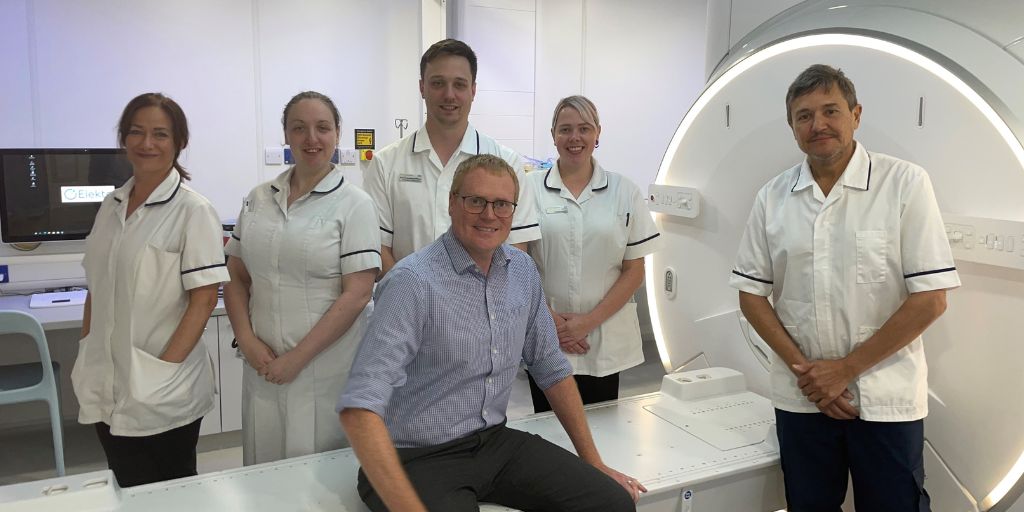
Funding from the West Yorkshire and Harrogate Cancer Alliance has enabled the delivery of cutting-edge technological initiatives to improve radiotherapy for patients with brain and liver cancer.
Working in partnership with technology company Philips, the Leeds Cancer Centre, St James University Hospital, is leading clinical innovation aimed at improving the planning of brain and liver radiotherapy respectively in two phases, by integrating advanced imaging techniques into the clinical pathway to deliver more precise and personalised care.
Phase one is now complete, allowing brain radiotherapy to be delivered using MRI-only treatment planning, with Leeds being the first centre in the UK to offer this technique, and only the third centre in the world to implement the Philips MRCAT technology
MRI-only treatment planning is the use of a single MRI scanning session to plan radiotherapy, rather than the conventional need for both CT and MRI scans. It has significant benefits for patients including minimising hospital appointments by reducing the number of scans needed, reducing the radiation dose received by patients and improving the accuracy and efficiency of the planning process – also making the patient’s experiences smoother and less stressful.
This achievement reflects Leeds Cancer Centre’s long-standing focus on research and innovation and supported by partnerships with leading organisations and investments in state-of-the-art technology. The dedicated MRI scanner, which is used to deliver this latest innovation, was funded by Leeds Hospitals Charity and the use of this is now expanded to benefit more patients.
Phase two is scheduled to take place over the next five years and will trial a new approach to planning and delivering liver radiotherapy. In the early stages, new types of MRI scans will be developed that allow radiotherapy to be planned with greater accuracy, by more clearly visualizing how the liver tumour moves. The use of these techniques is being pioneered in Leeds Teaching Hospitals NHS Trust together with Philips. This partnership positions Leeds to become the first centre in the world to plan the treatment of patients using this advanced technology.
In years three to five, artificial intelligence (AI) will be integrated into the treatment delivery pathway to power real time 4D motion tracking to predict and adapt the treatment to the movement of the liver and tumour during treatment. These advances will improve patient outcomes and reduce side effects of treatment.
Dr Bashar Al-Qaisieh, lead for research and innovation and radiotherapy imaging at Leeds Teaching Hospitals NHS Trust, said: “Our research aims to deliver smarter, kinder radiotherapy so that life beyond liver cancer diagnosis is the best it can be. We are very proud that Leeds Teaching Hospitals is pioneering this technology, in partnership with the Cancer Alliance and Philips, to offer better treatment and improved quality of life to our patients and beyond.”
Dr David Higgins, Philips Clinical Science Leader Europe – North, added, “The MRI provides superb and tunable soft-tissue contrast, and so MRI has emerged in recent years as a tool to enable more accurate planning of cancer treatments.
“In our partnership with the Leeds Teaching Hospitals NHS Trust, we are pushing the boundaries of what can be done with this method, to include information about organ motion. At Leeds they have the expertise and the knowledge to drive the field forward. Together we want to enable better care for more people.”
Jason Pawluk, Programme Director at the West Yorkshire and Harrogate Cancer Alliance, said: “Unfortunately, we know that outcomes from brain and liver cancer fall short of those which are achieved by international partners and that these tumours can often behave aggressively.
“Investments in these fields are vital. That’s why, as part of our innovation programme, we were delighted to support this proposal to bring better, more personalised, care to patients in West Yorkshire and Harrogate.
“We hope that the results will build the platform for extending these benefits more widely across the country and will continue to work with the clinical teams in Leeds and partners as the work progresses.”
The Cancer Alliance’s annual innovation funding competition, run in collaboration with Health Innovation Yorkshire and Humber, funds projects that promote early cancer diagnosis and better care.
The Innovation Award Scheme is a non-recurrent, revenue-only, financial awards scheme which seeks to:
• Promote innovation in cancer care
• Encourage the adoption, acceleration, and deployment of best practice
• Support the strategic objectives of the Cancer Alliance
• Ensure that available cancer transformation funding responds to needs identified locally, as well as those taken from policy priorities nationally
• Create opportunities to improve early diagnosis and patient experience in line with the NHS Long Term Plan
To learn more about these projects see our website: West Yorkshire and Harrogate Cancer Alliance. For more information, please contact the Cancer Alliance at wyicb-wak.











